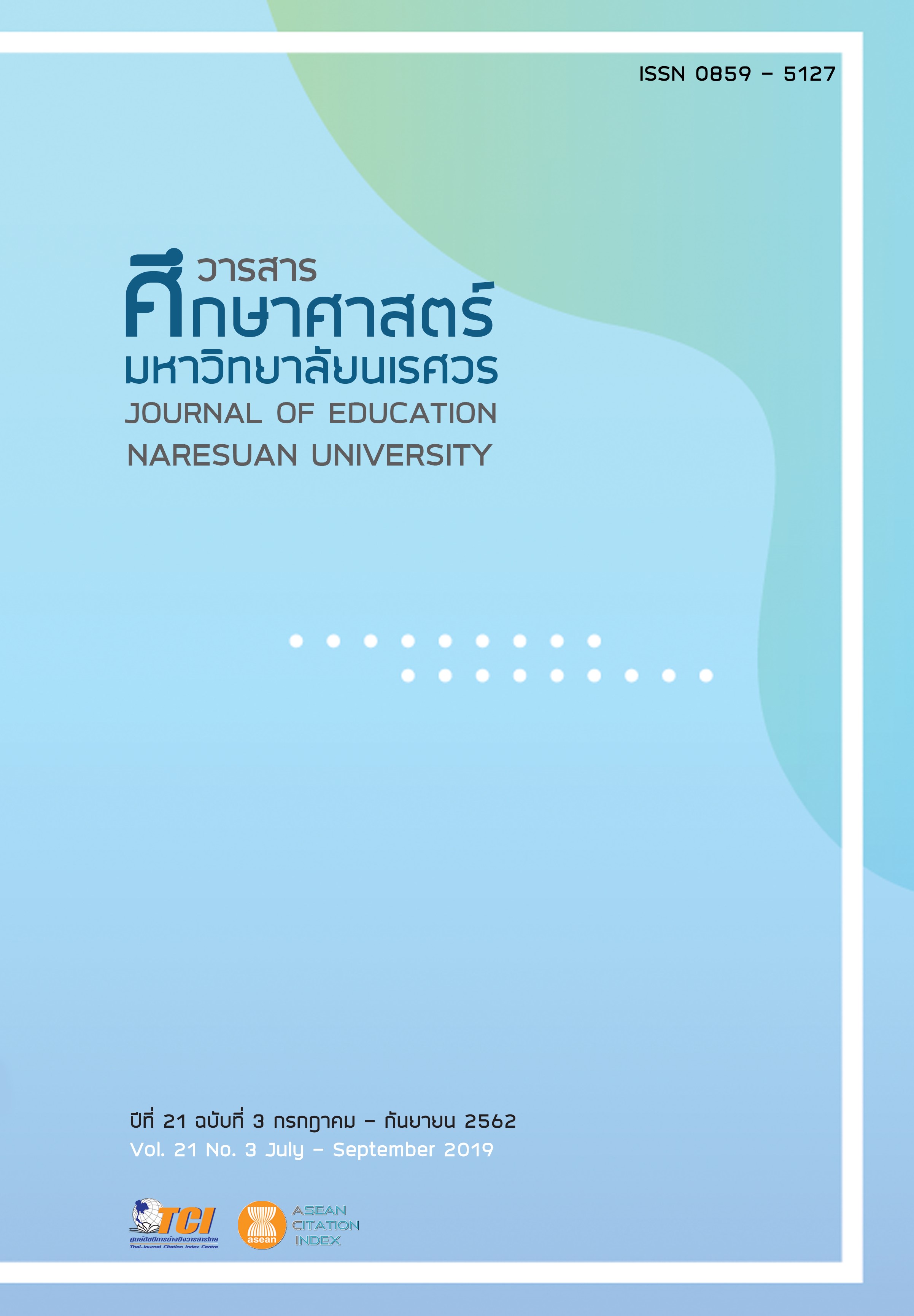การพัฒนารูปแบบการจัดการเรียนรู้โดยใช้กลวิธีการสอนอ่านแบบเมตาคอกนิชันและการเสริมต่อการเรียนรู้ เพื่อเสริมสร้างความสามารถในการอ่านเชิงวิเคราะห์ สำหรับนักเรียนชั้นมัธยมศึกษาตอนปลาย (THE DEVELOPMENT OF AN INSTRUCTIONAL MODEL BASED ON METACOGNITIVE READING STRATEGIES AND SCAFFOLDING TO ENHANCE ANALYTICAL READING ABILITY FOR UPPER SECONDARY STUDENTS)
Main Article Content
Abstract
การวิจัยนี้มีวัตถุประสงค์เพื่อพัฒนารูปแบบการจัดการเรียนรู้โดยใช้กลวิธีการสอนอ่านแบบเมตาคอกนิชัน และการเสริมต่อการเรียนรู้ เพื่อเสริมสร้างความสามารถในการอ่านเชิงวิเคราะห์ สำหรับนักเรียนชั้นมัธยมศึกษาตอนปลาย คือ 1) เพื่อสร้างและหาคุณภาพของรูปแบบการจัดการเรียนรู้ และ 2) เพื่อศึกษาผลการใช้รูปแบบการจัดการเรียนรู้ การวิจัยดำเนินการตามกระบวนการวิจัยและพัฒนา แบ่งออกเป็น 2 ขั้นตอน คือ 1) การสร้างและหาคุณภาพของรูปแบบการจัดการเรียนรู้ 2) ใช้และศึกษาผลการใช้รูปแบบการจัดการเรียนรู้ ในการวิจัยครั้งนี้กลุ่มตัวอย่างคือ นักเรียนระดับชั้นมัธยมศึกษาปีที่ 5/9 โรงเรียนพิจิตรพิทยาคม ภาคเรียนที่ 2 ปีการศึกษา 2559 ซึ่งได้มาจากการสุ่มแบบกลุ่ม จำนวน 39 คน เครื่องมือที่ใช้ในการวิจัย ได้แก่ แผนการจัดการเรียนรู้ตามรูปแบบฯ และแบบวัดความสามารถในการอ่านเชิงวิเคราะห์ วิเคราะห์ข้อมูลโดย ใช้สถิติทดสอบค่าที แบบไม่เป็นอิสระต่อกัน (t-test independent) ผลการวิจัย พบว่า รูปแบบการจัดการเรียนรู้ ที่ผู้วิจัยสร้างขึ้น มี 6 องค์ประกอบ ได้แก่ หลักการ วัตถุประสงค์ เนื้อหา กระบวนการจัดกิจกรรมการเรียนรู้ สื่อและแหล่งเรียนรู้ และการวัดและประเมินผล โดยมีกระบวนการจัดกิจกรรมการเรียนรู้ แบ่งออกได้เป็น 7 ขั้นตอน ตาม PreSAS WhileCI PostSA Model คือ ก่อนการอ่าน (Pre-reading) ขั้นกระตุ้นความรู้เดิม (Stimulate original knowledge) ขั้นเพิ่มเติมแผนการอ่าน (Added reading plans) ขั้นชำนาญตั้งวัตถุประสงค์ (Set Objective) ระหว่างการอ่าน (While-reading) ขั้นตรวจสอบตรงความเข้าใจ (Check for Understanding) ขั้นเรียนรู้ได้ให้บูรณาการ (Integration ) หลังการอ่าน (Post-reading) ขั้นสรุปผลและประเมินอ่านผ่านคุณค่า (Summarize and Evaluate of reading) ขั้นนำความรู้มาประยุกต์ใช้ในความคิด (Apply Knowledge) มีคุณภาพด้านความเหมาะสมอยู่ในระดับมากที่สุด และดัชนีประสิทธิผลรูปแบบการจัดการเรียนรู้ มีค่าเท่ากับ 0.6385 ผลการใช้รูปแบบการจัดการเรียนรู้ พบว่า นักเรียนที่เรียนด้วยรูปแบบการจัดการเรียนรู้ที่พัฒนาขึ้นมีความสามารถในการอ่านเชิงวิเคราะห์หลังเรียนสูงกว่าก่อนเรียนอย่างมีนัยสำคัญทางสถิติที่ระดับ .01 และ มีความสามารถในการอ่านเชิงวิเคราะห์สูงกว่าเกณฑ์ร้อยละ 70 อย่างมีนัยสำคัญทางสถิติที่ระดับ .01
THE DEVELOPMENT OF AN INSTRUCTIONAL MODEL BASED ON METACOGNITIVE READING STRATEGIES AND SCAFFOLDING TO ENHANCE ANALYTICAL READING ABILITY FOR UPPER SECONDARY STUDENTS
This research aimed to develop the instructional model based on Metacognitive Reading Strategies and scaffolding to enhance Analytical reading ability for upper secondary students. The specific purposes of this research were to develop and assess the quality of the model and study the results of using implementing the model. The research procedure comprised 2 steps. As followed 1) to develop and assess quality of the model, 2) to study the results of using the model. The samples used for the experiment was one classroom in Phichitpittayakom School. In the 2nd semester of the 2016 academic year, drawn by means of cluster random sampling. The research instruments were the lesson plans in the line of an instructional model developed and a multiple-choice test of Analytical reading ability. Data analysis were use dependent sample t-test. The results of the research were as followed : The developed model consisted of 6 components: principles, objectives, contents, teaching and learning process, media and learning resources, assessment and evaluation. The developed model are called PreSAS WhileCI PostSA Model consisted of Pre-reading: Stimulate original knowledge, Added reading plans, Set Objective, While-reading: Check for Understanding, Integration, and Post-reading: Summarize and Evaluate of reading and Apply Knowledge. The instructional model was verified by the 7 experts and it was a quality in aspect of an appropriateness which was at the highest. The effectiveness index of the instructional model was at to 0.6385. The experimental results using the instructional model found; The students’achieve of analytical reading ability after learning with the model higher than before at the .01 level of statistical significance and achievement of analytical reading ability after learned with the model higher than the 70 percent criterion at the .01 level of statistical significance.
Article Details
The owner of the article does not copy or violate any of its copyright. If any copyright infringement occurs or prosecution, in any case, the Editorial Board is not involved in all the rights to the owner of the article to be performed.
References
2. Buranasing, W., & Sattawut, N. (1999). Analytical reading for curriculum and instruction. Bangkok: Curriculum and Instruction Department, Faculty of Education Ramkamhaeng University. [in Thai]
3. Cho, K. (2001). The effects of argumentation scaffolds on argumentation and Problem solving in an online collaborative group problem-solving environment (Doctoral dissertation). State College, PA.: The Pennsylvania State University.
4. Dabbagh, N. (2003). Scaffolding: An important teacher competency in online learning. Tech Trends, 47(2), 39-44.
Eggen, P., & Kauchak, D. (1997). Education psychology: Windows on classrooms (3nd ed). New Jersey: Merrill, an Imprint of Prentice Hall.
5. Fogarty. R. (1994). Read about best practices in metacognitive strategies. Retrieved May 7, 2015, from http://www.bencharkeducation.com/education-leader/reading/metacognitive-strategies.html.
6. Jacobowitz, T. (1990). AIM: A metacognitive strategy for construction the main idea of text. Journal of Reading, 13(5), 620-623.
7. Joyce, B., & Weil, M. (2009). Models of teaching (8th ed.) New Jersey: Prentice-Hall.
8. Kaewurai, W. (2011). The development of Instruction model to improve the quality of learners into a moral society wisdom and learning. Journal of graduate Nakhon Sawan Rajabhat University, 6(15), 11-30. [in Thai]
9. Khemmani, T. (2007). Instruction science: Knowledge for effective learning management. Bangkok: Chulalongkorn University. [in Thai]
10. King, A. (1999). Mutual peer tutoring: Effects of structuring tutorial interaction to scaffold peer learning. Journal of Education Psychology, 90(1), 134-152.
11. Kusolsong, S., & Sittisomboon, M. (2017). The development of instructional model to enhance meta-cognitive strategies for Rajabhat University students. Journal of Education Naresuan University, 19(1), 117-130. [in Thai]
12. Loicharern, R. (2015). The development of the reading instructional model by using metacognitive strategies to enhance advanced Thai language comprehension of primary 6 students (Doctoral dissertation). Nakornsawan: Nakornsawan Rajabath University. [in Thai]
13. McLoughlin, C. (2002). Learner support in distance and networked learning environment: Ten dimensions for successful design. Distance Education, 23(2), 149-162.
14. National Institute of Education Testing Service (Public Organization). (2013). Results in O-NET 2013. Retrieved September 12, 2016, from http://www.niets.or.th [in Thai]
15. Roehler, C. V., & Cantlon, S. J. (1996). Scaffolding secondary student reading and studying of science and math textbooks. Retrieved November 8, 2012, from http://www.education.umd/literacy/Home/Faculty/holiday.htm
16. Seethong, P., Kaewurai, W., Wattanathorn, A., & Onthanee, A. (2016). The development of an instructional model based on collaborative learning with scaffolding to enhance Thai communicative writing ability for Prathomsuksa IV students. Journal of Education Naresuan University, 18(4), 69-85. [in Thai]
17. The Institute for the Promotion of Teaching Science and Technology. (2011). Evaluation results in PISA 2009 reading literacy mathematical literacy and scientific literacy. Bangkok: A-run Printing. [in Thai]
18. Vygotsky, L. S. (1978). Mind in society: The development of higher Psychological process. In M. Cole, V. John-steiner, S. scribner and E. souberman. (Eds.). Cambridge, MA: Harvard University Press.
19. Yuko Iwai. (2011). The effects of metacognitive reading strategies: Pedagogical implications for EFL/ESL Teachers. La Crosse: University of Wisconsin.
20. Zydney, J. M. (2004). The effects of different types of scaffolding in a multimedia program on students’ problem finding (Doctoral dissertation). New York: New York University.


